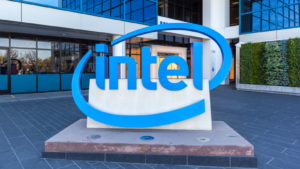Time will tell the outcome of that story. In the meantime, the market lull has created an opportunity in several of the Dow 30. At the time of writing, 28 of those 30 stocks are down on the day, multiple of which have fallen by 3%. The two that countered the trend are outlined in this article and represent some of the best Dow stocks to buy. Let’s take a look at those two firms and one other within the Dow Jones Industrial Average.
Walmart (WMT)

Walmart (NYSE:WMT) is arguably the most important U.S. retail stock and it has outperformed the S&P 500 so far in 2024. Shares are up more than 12% this year while the S&P 500 has grown by a more moderate 8.5%. That strong performance is one of the reasons that Walmart continues to rise even though almost all other Dow stocks have corrected.
Walmart continues to offer consumers a wide variety of goods at low prices. That continues to matter as inflation persists. This article in Barron’s suggests that American household net wealth is at a record high due to recent stock market performance. In turn, those consumers are unlikely to clamp down on spending and Walmart might not seem an obvious beneficiary as a result.
However, wealthier shoppers continue to trade down and Walmart is attempting to court them. Walmart is positioning itself to capture record net wealth that is also looking to trade down as inflation persists. Meanwhile, Walmart is traditionally well-positioned to capture the average retail consumer when inflation remains stubbornly high as it currently is.
Chevron (CVX)

Chevron (NYSE:CVX) is the other Dow stock performing well in early April. However, unlike Walmart, Chevron has not outperformed the S&P 500 this year.
That is changing rapidly as oil prices rise above $90 per barrel. Rising geopolitical tension in the Middle East is responsible for the rapid shift. Iran and Israel continue to discuss the next moves following an Israeli strike on the Iranian Embassy in Syria. That issue could pull the Iranian oil supply into an already complex situation that has the potential to raise prices higher.
The crucial Red Sea shipping routes have already become more expensive amid ongoing conflict. There is a clear risk compounding of factors that could rapidly raise prices again.
The result is of course that oil majors like Chevron stand to benefit. The energy sector is rapidly rising in value due to the situation in the Middle East and that is the prime reason investors should consider Chevron in April. Brent crude oil prices are currently above $90. Meanwhile, Chevron’s breakeven price is in the $40s. The complex Middle East situation paired with solid business profitability make CVX shares a must-buy at the moment.
Intel (INTC)

Intel’s (NASDAQ:INTC) stock is getting much more interesting in the wake of recent events. Everyone who follows the chip sector is aware of the vital importance of the island of Taiwan. It is home to major manufacturers, notably Taiwan Semiconductor Manufacturing (NYSE:TSM).
The same followers were reminded of the importance of diversification away from Taiwan following the recent earthquake there. The United States has been actively attempting to diversify its chip manufacturing base for geopolitical reasons. The recent earthquake provides additional incentive to up those efforts.
Intel is central to those efforts. The company is building a Foundry to compete with TSMC. To date, it hasn’t been especially successful. Intel lost $7 billion in 2023 on its foundry business despite sales of nearly $19 billion. Hopefully, Intel can turn its business around given how much federal subsidies it has been awarded. Positive news in that regard could come later this month when the company reports earnings on April 25.
The point here is that Intel is the largest beneficiary of U.S. efforts to re-shore chip foundry activities. Intel hasn’t yet figured out how to do so profitably but those willing to make a somewhat contrarian bet may find out that it is indeed a must-buy stock in the near to medium term.
On the date of publication, Alex Sirois did not have (either directly or indirectly) any positions in the securities mentioned in this article. The opinions expressed in this article are those of the writer, subject to the InvestorPlace.com Publishing Guidelines.
Alex Sirois is a freelance contributor to InvestorPlace whose personal stock investing style is focused on long-term, buy-and-hold, wealth-building stock picks. Having worked in several industries from e-commerce to translation to education and utilizing his MBA from George Washington University, he brings a diverse set of skills through which he filters his writing.
